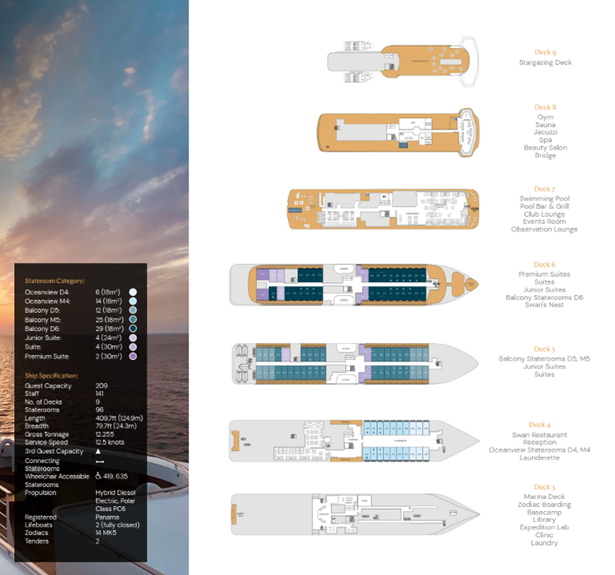
Uncover thrilling terrain where the raw power of nature sparks the imagination. From Iceland's volcanic shores to Norway's Lofoten Islands, this voyage explores dynamic landscapes shaped by ice and fire. Witness breaching whales off Iceland's north coast and navigate deep fjords framed by snow-capped peaks. Island-hop through the Lofotens, a haven of fishing villages and seabird cliffs while embracing the midnight sun before arriving in Tromsø.
- Reykjavik, Iceland's vibrant capital, boasts iconic landmarks like the Hallgrimskirkja church and offers experiences ranging from geothermal spas to cultural tours.
- Witness the breathtaking beauty of Iceland's Látrabjarg cliffs, home to diverse seabird species including puffins and guillemots, offering a unique wildlife encounter.
- Explore the Arctic wonders of Tromso, Norway, a gateway to the Northern Lights and midnight sun, where historic sites like the Arctic Cathedral and Polar Museum await discovery amidst stunning natural landscapes.
Prices quoted here are often dependent on currency fluctuations. Please check with (01432 507450 or [email protected]) for the very latest price, which may well be cheaper than the one advertised here.
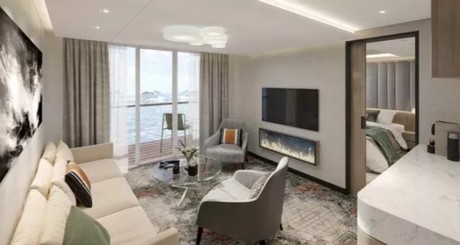

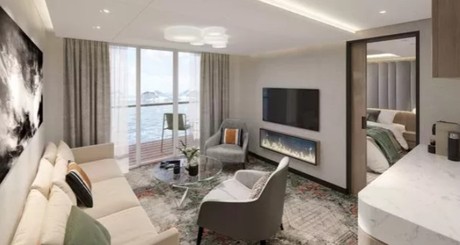
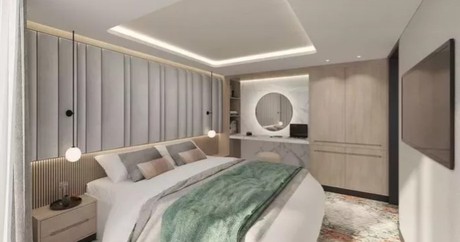




In the centre of Iceland’s sprawling capital city, the modern organ-pipe-shaped Hallgrimskirkja church dominates the top of town. Cosy bars, cafes and shops line the surrounding streets heated by Iceland's geothermal waters. The regenerated harbour is home to a striking modern concert hall. Popular trips include to the Blue Lagoon, a geothermal spa near the village of Grindavik, and the Golden Circle tour taking in Gullfoss Waterfall and the mighty Strokkur geyser in Thingvellir National Park.
The dramatic 400-metre high Látrabjarg cliffs stretch 14 km along Iceland's and Europe's westernmost edge. As the largest seabird cliff in Europe, Látrabjarg is home to thousands of breeding birds: Atlantic puffins, gannets, guillemots, fulmar and kittiwakes as well as 40 percent of the world's population of razorbills belonging to the auk family.
Considered one of Iceland’s most impressive falls, the thunderous Dynjandi waterfall in the Westfjords region gives the impression of a bridal veil as it spreads down ever-growing cascades. The walk takes 15 minutes passing five smaller waterfalls. Nearby, Hrafnseyri is the birthplace of Jón Sigurðsson, 19th-century leader of the Icelandic Independence movement. The museum includes an Icelandic turf house.
Surrounded by fjords in the Westfjords region, Ísafjördur is a bustling fishing town in northwest Iceland with colourful wooden 18th- and 19th-century houses in its old town, Neskaupstadur. Nearby, Sudavik is home to the Arctic Fox Centre. Iceland’s only mammal, the arctic fox, lives on the lush tundra of Hornstrandir Nature Reserve, the northernmost peninsula in the Westfjords with two of Europe’s largest bird cliffs.
A jewel of the Westfjords, Vigur is the fjord's second-largest island and a thriving seabird sanctuary. Flocks of arctic terns, puffins, guillemots and eider ducks nest atop rocky cliffs. As one of only two inhabited islands, Vigur supports a family farm continuing the centuries-old eiderdown harvest across 3,500 nests. This remote pillar also houses Iceland's sole windmill, its tiniest post office and a 200-year-old, still-seaworthy rowing boat.
Grímsey is a remote island located 40 km off Iceland’s north coast. Many people travel here for the purpose of setting foot in the Arctic Circle, the only place in Iceland where you can. The island is also home to fewer than 100 people, but over one million seabirds. Birdlife thrives here thanks to the lack of egg predation and the well-stocked surrounding seas. Grímsey has one of Iceland’s largest tern nesting sites and largest puffin colonies.
Hrisey Island is a small island in the Eyjafjordur fjord in northern Iceland. It is home to various wildlife, including puffins, seals, and whales. Hriseyjarfjall Mountain is the highest point and offers views of the surrounding landscape and the vast expanse of Eyjafjörður fjord. Despite its size, Hrisey Island possesses a rich cultural heritage. Traditional Icelandic crafts, such as hand-knitting and woodworking, preserve the island's identity.
Húsavík, overlooking Skjálfandi Bay, is famed for whale watching, especially the endangered blue whale. The town's Whale and Exploration Museums focusses on Viking history and Apollo astronaut training, taking place nearby. The town also marks Iceland's first house from 860 AD. Húsavík is on the Arctic Coast Way and the start of the Diamond Circle route. Nearby, Kaldbakur pond is a popular geothermal swimming spot oddly populated with goldfish.
Known for puffin encounters, hiking trails and scenic beauty. Bakkagerði is the largest settlement in the Borgarfjörður Eystri fjord and a base for exploring the rugged wilderness. A popular trail leads to the Giant Boulders at Stórurð. The local church features a 1914 altarpiece depicting Christ on Álfaborg rock, aka the City of Elves, with the Dyrfjöll Mountains behind. Nearby Hafnarhólmi rock is a sanctuary for kittiwakes and other seabirds.
Sea days are rarely dull. Take the time to sit back and let the world go by. The ship’s observation decks provide stunning views of the passing ocean. A day at sea gives you the opportunity to mingle with other passengers and share your experiences of this incredible trip or head to our library which is stocked full of reference books. Get an expert’s view in one of our on-board lectures or perhaps perfect your photography skills with invaluable advice from our onboard professional photographers.
Bodø highlights its Sami heritage and connects the arts to its Arctic setting. Rebuilt after the 1940 bombing in modernist "reconstruction" style, Bodø's architectural commitment endures with the 2014-built Stormen concert hall and Molobyen, a new waterfront cultural hub. Surrounded by natural landscapes, Bodø lies near the world-famous maelstrom of Saltstraumen, a powerful whirlpool on the Saltsfjorden strongest when the tides change daily.
The mighty Svartisen glacier, Norway’s second biggest, pours down the mountain almost to Svartisvatnet lake. The glacier visitor centre is a fascinating place with access to hikes along the edge of the ice flow, up to 200 m thick. Glorious Holandsfjord is just the other end of a short channel from the lake and the ship has stirring views. The little village of Holandsvika sits across the fjord, with an 18-km lakeside path and boat trips.
Svolvær is a classic Norwegian fishing port, tucked away on Austvågøya in the Lofoten Islands. Surrounded by peaks and beaches, bays and craggy inlets, it’s an age-old picture, a jumble of white and red clapboard houses, the clear water filled with little, bobbing boats. Popular with mountain climbers, the town’s mountain Fløya commands a spectacular viewpoint across the harbour and Vestfjord.
Trollfjorden is unbelievable. A 100 m-wide entrance to a narrow fjord with near-vertical mountainous sides up to 1,100 m high, the passage slices through Austvågøya, on the edge of the Lofoten Islands. As the ship enters the fjord, the silence is only broken by the gentle sound of the ship's engines and the occasional cry of a white-tailed eagle soaring overhead. At the end of the fjord, the ship slowly spins, offering a final captivating view.
The Arctic gateway, Tromso at 69 degrees north, is renowned for the midnight sun in summer and the Northern Lights in winter. The Arctic Cathedral, with stained-glass windows, hosts midnight concerts. The Fjellheisen cable car offers panoramic views from Mount Storsteinen, while the historic centre features old wooden houses. The Polar Museum chronicles early polar explorations, and the thriving Alpine Botanic Garden adds to Tromso's charm.
Itineraries are subject to change.
Diana
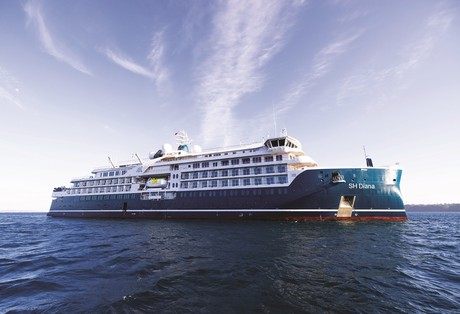
| Length | 125 metres |
|---|---|
| Launched | 2022/23 |
Launched in 2023, SH Diana provides elegant and spacious 5-star accommodation for 192 guests in 96 spacious staterooms and suites, the vast majority with large balconies. Operated by an onboard team of 140 she provides a high level of personal service, exploring the Mediterranean and its famous sites of antiquity.
Now sit back, relax and take a moment to get to know this amazing new ship, purpose-designed for our unique cultural expedition cruises.
Named after the Ancient Roman goddess of light, the moon, hunting and the wilderness, SH Diana been specially designed for worldwide cruising to explore the most inspiring and inaccessible places on earth. Building on the outstanding amenities of her sister ships, she adds a dedicated Multifunctional Room next to the Observation Lounge, a Private Dining Room for special occasions, and two tenders which bring guests a comfortable alternative to Zodiacs for expedition landings. A Polar Class 6 ice-strengthened hull combines with extra-large stabilisers to make your journey as comfortable as possible.
SH Diana has been designed for immersive experiences, with extensive outside deck areas, multiple observation points and bright, open and relaxing public spaces with unobstructed views.
The pleasure and safety of our guests is paramount at all times, cared for by our attentive crew and seasoned expedition leaders. Cutting edge hygiene technology protects the health of all on board to the highest standards and includes air conditioning with UV sanitisation systems.
SH Diana’s 96 staterooms , including 11 suites, are each a superbly comfortable home from home and all feature panoramic sea views, a flame-effect fireplace, original works of art, plush couches, premium pocket sprung mattresses, en-suite bathrooms with glass-enclosed rain showers, and Egyptian cotton towels, bathrobes and sheets. A pillow menu offers customised head and neck comfort during rest, while a large flat screen TV, espresso machine with Illy premium coffee, tea making facilities with the finest Kusmi teas, and a minibar with refreshments enhance relaxation at any time. In-room dining is of course available at all hours.
Wheelchair access
Guests who use wheelchairs must bring their own, as we have only a small number of wheelchairs stored onboard for emergencies. To ensure ease of movement on the ship, wheelchairs and mobility aids must be no wider than 65cm. All mobility or medical equipment brought on board must be capable of being carried safely and must be declared before sailing. To ensure that all guests can safely evacuate during an emergency, guests requiring a wheelchair can only be accommodated in our ADA-accessible cabins.
We offer an Oceanview and a Balcony stateroom on Diana. These staterooms are specifically designed to be completely ADA compliant and have a fully operable wheelchair-access wet unit.
Diana has two lifts, serving every passenger deck apart from the Stargazing top deck, which is, therefore, more difficult to access, as are the Aft Marina and Swan’s Nest forward observation platform. Also, we don’t have special equipment to access the swimming pool, jacuzzi, or sauna. Otherwise, the ship is entirely at your disposal.
Many of the expeditions ashore in remote places are by Zodiac. Boarding these boats and returning aboard can present challenges for wheelchair users, as can navigating uneven terrain. These challenges are by no means always insurmountable, though, and our highly experienced crew is trained to provide reliable advice and assistance. They will make every effort to ensure wheelchair-using guests enjoy a memorable experience at each destination. Our general guidance, however, is to recommend wheelchair users travel with a companion for their ease and enjoyment.
If you prefer to remain aboard, our panoramic interiors and ample open decks ensure an immersive, intimate experience of your inspiring surroundings.
